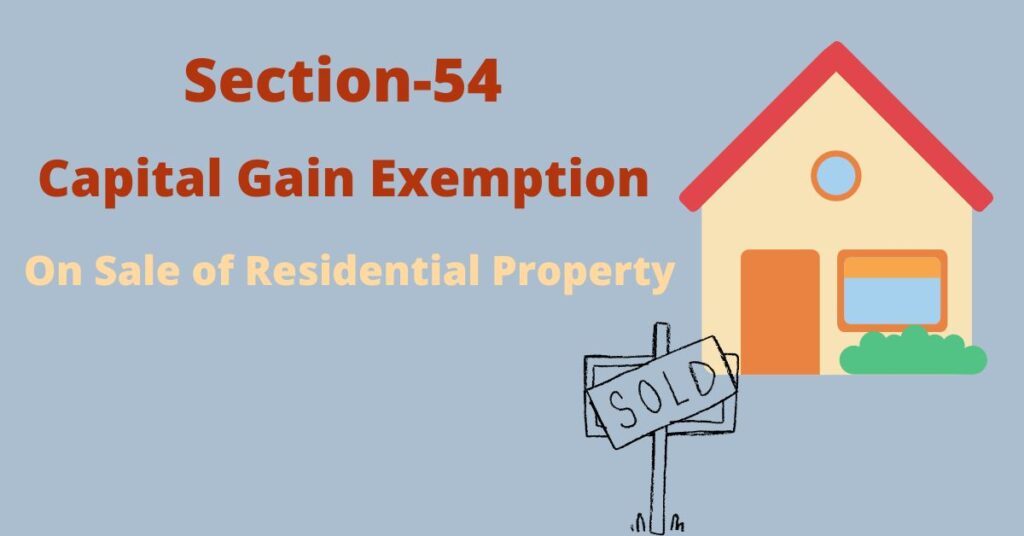Table of Contents
Meaning of Section-54
- Generally, people shift their houses for some reason, which shows their intention was not to earn any profit by selling residential house property.
- Section 54 gives relief to taxpayers who sold their houses and bought a new residential house from sale proceeds.
Conditions to Claim Exemptions Under Section-54
- Exemption of section 54 is only available for Individuals or HUF.
- Residential house property should be long-term capital assets.
- Taxpayer should –
- Acquire another residential house property within one year before or two years after the date of transfer of the old house property.
OR
- Construct a new residential house property within three years from the transfer of title of an old house.
4. The exemption can be claimed only in respect of one residential house property purchased/constructed in India. ( no exemption can be claimed in respect of house property purchased outside India.)
Note:- With effect from assessment year 2021-22, Exemption for investment made, by way of purchase or construction in two residential house properties shall be available if the amount of long capital gain does not exceed 2 crores. (This option can be exercised once in a lifetime)
Note:- As per section 2(14) of the Income Tax Act, 1961, Immovable property (Land or building or both) held for more than 24 months immediately before the date of transfer shall be treated as long-term capital assets.
Note:- For claiming exemption u/s-54, the purchase date will be considered the date on which the assessee took possession of the new house.
Consequences If Newly Purchased House Property is Transferred:-
If the Taxpayer sold his new house property before 3 years from the date of purchase/completion of construction after claiming exemption under section-54. The amount of capital gain claimed, as exempt under section-54, will be deducted from the cost of the acquisition of a new house.
Example: Mr. Ram sold his house in Aug 2021 for 20,00,000. Long-term capital gain arising on the transfer of the old house amounted to 800,000. In Feb 2022, he bought another residential house for 1500,000. However, the new house was sold in Nov 2022 for 20,00,000 (the stamp duty value of a new house was 1800,000). What will be the amount of taxable capital gain in the hands of Mr. Ram for the financial year 2021-22 and 2022-23?
Solution: Computation of capital gain for the financial year 2021-22
| Particular | Amount |
| Long-term capital gain arising on transfer of old house | 800,000 |
| (-) Exemption under section-54 | (800,000) |
| Taxable Long-Term Capital Gain | NIL |
* Exemption under section 54 will be lower of the following :
(a) Amount of capital gain arising on the transfer of residential property
Or
(b) Amount of investment made in residential house property.
Computation of capital gain for financial the year 2022-23
| Particulars | Amount |
| Consideration Value | 20,00,000 |
| (-) Expenditure incurred for the transfer of capital assets | Nil |
| Net Sale Consideration Value | 20,00,000 |
| (-) Cost of acquisition ( WN-1 ) | 700,000 |
| 1300,000 |
Capital Gain Deposit Account Scheme:-
If till the date of filing an income tax return, the capital gain arising from the transfer of residential house property has not been utilized to purchase or construct residential house property, then the benefit of exemption under section 54 can be availed by depositing the unutilized amount in “Capital Gain Deposit Account Scheme”.
New residential house property can be purchased or constructed by withdrawing an amount from the said account within a specified time limit of 2 years or 3 years, as the case may be.
Treatment for Unutilised Amount Deposited in Capital Gain Scheme:-
If the amount deposited in the capital gain account scheme did not utilize within the time limit specified for the purchase/construction of a residential house, then the unutilized amount will be taxed as long-term capital gain in the year in which specified 2 years / 3 years get over.
Example: Mr. Shyam sold a residential house on 15 July 2022 for 1500,000. Long-term capital gain arising on the sale of a residential house amounted to 500,000. But he did not purchase/construct another house by 31st July 2023. However, he deposited 500,000 in the Capital Gain Deposit Account Scheme in July 2023. Till 14 July 2025, he did not purchase any residential house nor constructed any house. Will he be entitled to claim an exemption under section 54? If yes, will the exemption granted be revoked subsequently?
Solution : (In Short) Mr. Shyam is eligible to claim exemption u/s -54 for 500,000 as he deposited the whole amount in the capital gain deposit account scheme before filing an income tax return. But later he did not purchase/construct any residential house within the specified time of 2 years (i.e. 14 July 2024) / 3 years (i.e. 14 July 2025). So the amount of 500,000 will be taxed as long-term capital gain in the financial year 2025-26.

